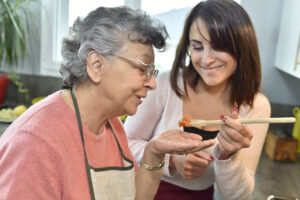Dementia doesn’t mean that your senior is suddenly incapable of handling normal daily tasks. As dementia progresses, she may have more difficulty, though. It’s really important to let her handle what she can and to give her the space to explore what she can still do on her own.

Senior Care Queens NY – Four Ways to Adjust Activities for Someone with Dementia
Put Activities Together in Advance
Whatever it is that your senior is doing, try to set it up for her in advance. This might mean that you group towels and washcloths separately for her to fold them or that you lay out her clothing so that she can get dressed. This works a little like limiting choices for your senior in that it keeps her from being overwhelmed by “too much” of anything. This can help her to avoid a lot of confusion and stick to the goal of the activity, whatever it is.
Stay There in Case She Needs Help
You probably have other things to do, but it’s important that you stay there with your senior. If there’s something you can do in the same room, that’s perfect. You don’t need to cross your arms and stare, but simply being there lets her know that you’re nearby if she runs into trouble. Proximity can help her to stay on task, too, especially if it’s a task that she might need a little help with.
Give Her Prompts Instead of Taking Over
One mistake that caregivers often make is that they simply take over the task when their elderly family member starts to have trouble. This might not be the right way to go. Your senior might need a verbal or visual cue to know what the next step is, but that doesn’t mean she needs full-on help. Remember to use positive language and tone of voice to encourage your senior.
Let Her Ask for Help or Only Step in if Safety Is an Issue
If she gets truly stuck, your elderly family member may know that she can ask for help. Start to learn her cues. If she’s in the earlier stages of dementia, she may ask for your help. In the later stages, that’s not always possible, so learning the cues when she really does need help is crucial. Any time that her safety is an issue you need to step in right away.
This can be a difficult balancing act for both you and your senior. Working with senior care providers can help because they’ve got experience with letting aging adults handle what they can and stepping in only when necessary. They can also show you new ways to modify tasks for your senior.

